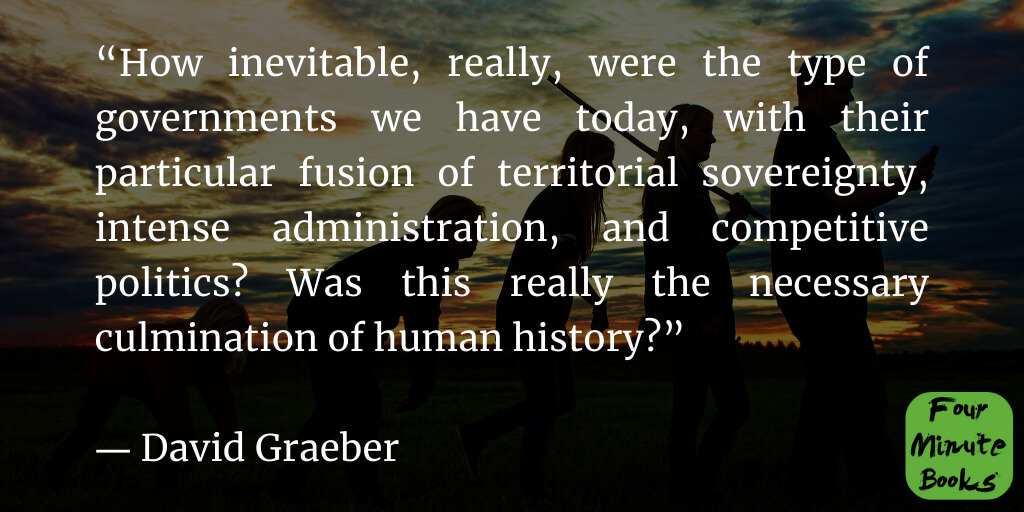1-Sentence-Summary: The Dawn of Everything tells the story of how we went from hunter-gatherers to city-builders, from the Stone Age to today’s modern world, all by exploring a series of new discoveries made by scientists who are challenging some long-held beliefs about our history.
Read in: 4 minutes
Favorite quote from the author:

Table of Contents
Video Summary

The Dawn of Everything is based on new discoveries made by scientists who are challenging some long-held beliefs about our history—including whether or not humans were even capable of building cities at all before around 10,000 years ago.
The author takes viewers on an epic journey through time, starting with our earliest ancestors and ending with an exploration into what might have happened if life had taken a different path for our species. He also looks at what could have happened if things went differently.
Here are three of my favorite lessons from the book:
- J.J. Rousseau and Hobbes shaped the first prominent views of humanity’s evolution as a society.
- Slaves were considered necessary, although not everyone was happy with the idea of forced labor.
- Early monarchs used violence, control of information, and charisma to exercise their powers.
Let’s learn more about the dawn of humanity by exploring these lessons in detail below!
The Dawn of Everything Summary
Lesson 1: Philosophers and thinkers from the 17th and 18th centuries shaped much of what we know today about the world.
In the 18th century, Jean-Jacques Rousseau and Thomas Hobbes were two of the most prominent philosophers in Western Europe. Their views about humanity were completely opposed.
Rousseau believed that human beings were inherently good. And that if society did not corrupt them, they would be kind and generous to one another. He said the agricultural revolution pushed people into a new world where they live in more complex structures that don’t benefit their true nature as hunter-gatherers.
Hobbes disagreed with Rousseau’s theory. He believed that human beings were inherently evil and selfish by nature. He also said that society was necessary in order to keep them from destroying each other. In fact, he thought that without social rules and laws, people would constantly fight over resources until there was nothing left to fight over!
Historians thought that both these views are partially correct and that we are a bit of both. However, modern thinkers are starting to argue that society didn’t develop as linearly as we were taught. In fact, there is more to history than these views and a lot of going backward instead of forward that we never knew about!
Lesson 2: The idea of slavery didn’t sit well with many, yet the workforce needed to provide food fell on slaves.
In the 15th century, the situation in Europe was dire. The Black Death had spread across the continent, killing over a third of its population. With so many people dead, there was a shortage of labor. This led to a popular idea: slavery.
When Europeans came to America and saw that the people here had different ideas about property ownership and slavery, they were shocked—and thought they’d found paradise. People in northern California lived communally and shared their possessions with each other.
They didn’t have any concept of private property or slavery because it wasn’t necessary for survival; This seemed like an ideal way of life to many Europeans who had grown tired of living with little food and no freedom under monarchies that treated them like slaves themselves.
However, many also felt that this way of life was too utopian to be true. In time, slavery became popular and lucrative, so it was maintained for hundreds of years. Slaves were major contributors to the lavish lifestyle of monarchs, although many didn’t agree with this idea.
Lesson 3: Monarchies began gaining power by exercising their power in three ways.
Early kings relied on three principles: control of violence, control of information, and individual charisma. Otherwise, how would’ve they kept their power and authority? At the beginning of the monarchy, people still weren’t convinced that this is the direction they should be taking, but soon they were left with no choice.
The first principle is control of violence. In order to gain power and maintain it, kings had to be able to use violence as a tool for punishment and reward. They also needed to be able to use the threat of violence as a way of keeping their subjects in line.
Control of information was essential because it allowed kings to spread propaganda about themselves and their accomplishments throughout their kingdoms. The kings didn’t just want people to know how great they were; they wanted people to believe it too!
Thirdly, they had great charisma. Rulers need to inspire the masses and be present in the public eye in order to keep people in control. They need to look fierce, unbeatable, and be respected. Therefore, charisma plays a huge role in the process.
The Dawn of Everything Review
The Dawn of Everything is nothing short of an extraordinary lecture, especially if you’re into science or history, as well as the problems of the modern world.
The book explores how early humans migrated out of Africa and across Europe; how they learned to make tools and build shelters; how they developed agriculture; how they created cities; how they developed writing systems; how they fought wars; how they rose up against oppression, and many more.
I highly recommend it to anyone looking to widen their perspective on life and enjoy a put-together, well-written lecture.
Who would I recommend The Dawn of Everything summary to?
The 35-year-old history enthusiast, the 40-year-old person who wants to learn more about the way humans evolved and the psychology of people, or the 20-year-old philosophy student who reads outside their curricula.
Last Updated on June 15, 2023